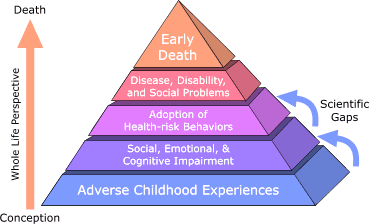I’ve tried to communicate as much as possible about the ACE Study in recent months. The implications cannot be overstated. The study shows more clearly than most of us could imagine, the clear connection between certain childhood experiences and the problems so often seen in adulthood. And I’m not just talking about addiction or behavioral health problems. The summary concludes that Adverse Childhood Experiences are “the leading determinant of the health, social and economic well-being of our nation”.
I was asked last week if it is ethical for an addictions counselor to focus heavily on issues such as anxiety and trauma. My first response is that it would be unethical not to. After further consideration, I realized how many drug and alcohol counselors have little to no formal training in the recognition and treatment of trauma. So my response to the question is that as addictions counselors, we have an ethical responsibility to learn to recognize and address the effects of trauma.
Here is a short (14:31) minute video providing an executive summary of the ACE Study from the Academy on Violence and Abuse. When finished watching the video, click on the ACE Survey tab at the top of the page to complete our short (less than 5 minute) questionnaire on Adverse Childhood Experiences. There are also links below the video for more information on trauma in general and the ACE Study in particular.
Centers for Disease Control ACE Study Page



2 thoughts on “ACE Study Executive Summary”
Outstanding! I am a MFT intern and drug/alcohol/domestic violence counselor and mediator.
This was quite educational. I learned a few things personally about myself.
God bless,
Comments are closed.